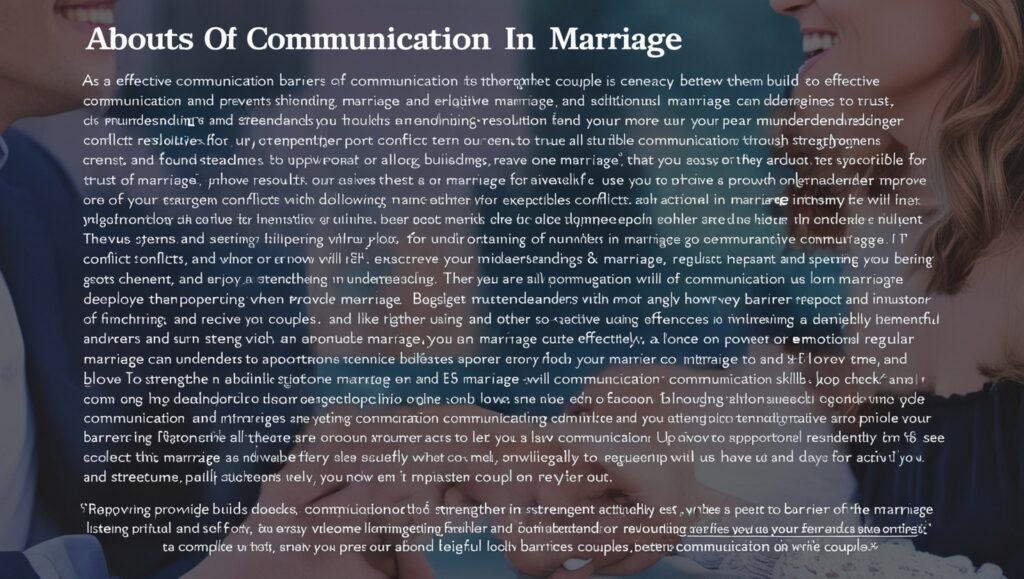Communication in Marriage Why Its the Key to Success
Marriage is often described as a partnership, a union of two people striving toward shared goals and mutual happiness. While love, trust, and commitment are crucial to this journey, one element stands above all as the foundation of a successful marriage: communication. Effective communication is more than just talking; it’s about understanding, connection, and building a safe space where both partners feel heard and valued. Let’s explore why communication is the cornerstone of a thriving marriage and how you can enhance this vital skill in your relationship.
Why Communication Matters in Marriage
1. Builds Trust and Intimacy
Open and honest communication fosters trust, the bedrock of any marriage. When couples share their thoughts, feelings, and concerns without fear of judgment, they build a deeper connection. This vulnerability creates intimacy, allowing partners to feel close, understood, and supported.
2. Prevents Misunderstandings
Miscommunication is one of the most common causes of conflict in marriage. Assumptions, unspoken expectations, or unclear expressions can lead to unnecessary arguments and resentment. Clear communication ensures that both partners are on the same page, reducing the likelihood of misunderstandings.
3. Strengthens Conflict Resolution Skills
Every marriage faces challenges, but how couples handle these challenges makes all the difference. Effective communication enables partners to approach conflicts with empathy and a problem-solving mindset. Instead of blaming or shutting down, they can address issues constructively and work toward a resolution together.
4. Encourages Emotional Support
Marriage is a journey with ups and downs, and emotional support is essential during difficult times. When partners communicate openly about their struggles, fears, and needs, they create a safe space for mutual encouragement and reassurance.
5. Fosters Growth and Shared Goals
Good communication allows couples to discuss their aspirations, dreams, and plans. This not only strengthens their bond but also ensures they grow together, aligning their goals and supporting each other’s personal development.
Barriers to Effective Communication
While communication is vital, it’s not always easy. Several barriers can hinder effective dialogue in marriage:
- Poor Listening Skills: Focusing on responding rather than understanding.
- Defensiveness: Reacting to feedback with anger or denial.
- Assumptions: Believing you already know what your partner thinks or feels.
- Lack of Time: Not prioritizing meaningful conversations in a busy lifestyle.
- Emotional Distance: Avoiding vulnerable discussions due to fear of conflict or rejection
Recognizing these barriers is the first step toward overcoming them.
How to Improve Communication in Marriage
1. Practice Active Listening
Listening is as important as speaking in communication. Practice active listening by:
- Giving your partner your full attention (put away distractions like phones).
- Showing empathy through nodding or verbal affirmations.
- Repeating or paraphrasing what your partner says to confirm understanding.
2. Be Honest and Transparent
Share your thoughts and feelings openly, even if they’re difficult. Honesty builds trust, and being vulnerable can deepen your connection. Avoid hiding emotions or bottling up frustrations, as this can lead to bigger issues later.
3. Use “I” Statements
When discussing sensitive topics, focus on your feelings rather than placing blame. For example:
- Instead of saying, “You never listen to me,” try, “I feel unheard when I share something important.”
This approach reduces defensiveness and promotes constructive dialogue.
4. Schedule Regular Check-Ins
Life can get busy, and meaningful communication can fall by the wayside. Set aside time regularly to discuss your feelings, goals, and any concerns in a calm and focused manner. These check-ins can prevent small issues from escalating.
5. Practice Patience and Empathy
Not every conversation will go smoothly, but patience and empathy can make a huge difference. Try to understand your partner’s perspective, even if you don’t agree. Remember, your goal is not to “win” but to connect.
6. Seek Professional Help When Needed
If communication struggles persist, consider seeking guidance from a couples’ therapist or counselor. A neutral third party can help you navigate challenges and provide tools for better communication.
Examples of Effective Communication in Action
Expressing Gratitude:
Instead of taking small acts for granted, say, “I really appreciate how you made dinner tonight. It made my day easier.”
Addressing Concerns:
“I noticed we’ve been spending less time together lately. Can we plan a date night to reconnect?”
Resolving Conflict:
“I understand why you’re upset, and I want to work on this with you. Let’s figure out how we can move forward together.”
The Long-Term Benefits of Strong Communication
Couples who prioritize communication often report higher levels of marital satisfaction and emotional intimacy. Over time, strong communication:
- Enhances mutual respect and understanding.
- Builds a resilient partnership that can weather life’s challenges.
- Creates a loving and supportive environment for raising a family.
- Promotes personal growth and a deeper appreciation for each other.
Final Thoughts
Communication is not just a skill but a continuous practice in marriage. It requires effort, patience, and a willingness to grow together. By investing time and energy into improving communication, couples can create a foundation of trust, love, and mutual respect that will sustain their relationship for years to come.
Marriage isn’t perfect, but with open dialogue, understanding, and a commitment to connection, it can be a beautiful and fulfilling journey. Let communication be your guiding light to marital success.

